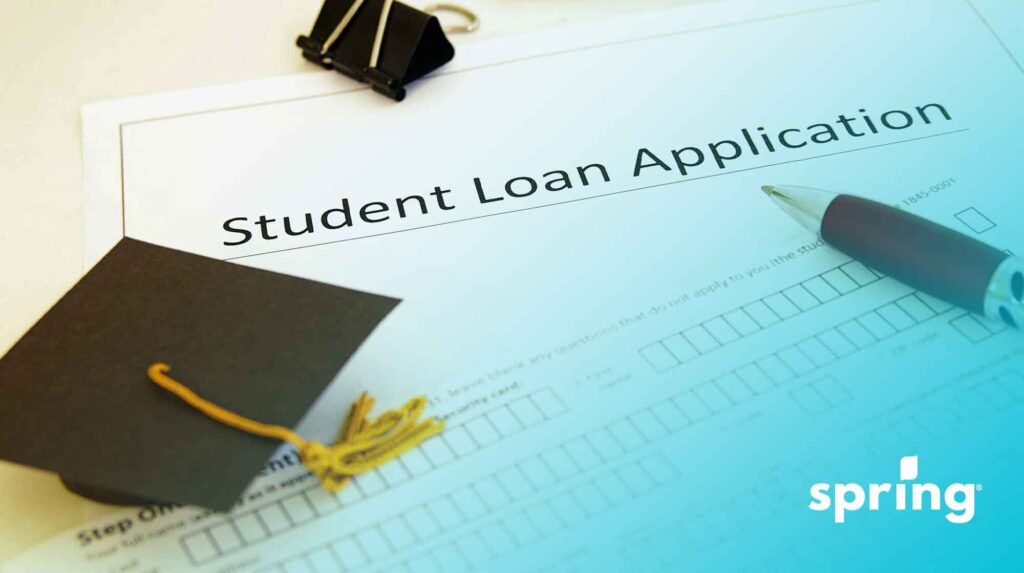The difference between a student loan and a regular loan is the interest rate and when the loan has to be repaid. Many student loans don’t require repayment until an allotted period of time after you’ve completed your education. The interest rate depends on your credit score, but it’s often lower than a traditional loan.
When it comes to applying for and getting a student loan, you need to consider your annual income and your credit score. Depending on which type of student loan you choose to get, these requirements will vary. Even though it can be more complex, it’s even possible to get a student loan with an adverse credit history. Depending on citizenship status, some international students are also eligible for student loans. Let’s take a look at how to do that.
Federal Student Loans in Canada
In Canada, you can get student grants and loans through the Canada Student Financial Assistance Program. Whether you’re a full-time or part-time student, you can apply for both grants and loans.
While the government of Canada is involved in the student grants and loans program, you do have to apply through your province or territory. From there, you’ll be eligible for both federal aid and provincial aid. How much you’re approved for is based on your individual financial situation and will be assessed once you apply. Some other factors that will influence the decision are:
- The province or territory you reside in.
- Your total family income.
- The number of dependents you have
- The cost of your tuition fees and living expenses
- Whether or not you’re diagnosed with a disability.
Once you receive the student loans, there are lifetime limits on how much you can receive in student aid. As a full-time student, you can receive up to 340 weeks of student aid. That said, there are some exceptions. If you’re a student who’s enrolled in doctoral studies, you can receive up to 400 weeks of student aid. Students with disabilities can receive up to 520 weeks of student aid.
One of the great things about these student loans is that most federal student loans typically don’t have to be paid for until your studies are completed. Specifically, with many federal student loans, you have 6 months after you finish going to school until you have to start repaying your student loans. While other federal loans, like those in the US, have an origination fee, Canadian federal student loans do not.
Student Loans From Financial Institutions
Getting a student loan through the government isn’t the only option. You can also get student loans through your financial institution. That said, each financial institution will have its own set of requirements. Here are the requirements for the top 5 banks in Canada.
Royal Bank of Canada
RBC is a financial institution in Canada that offers student loans and student lines of credit. There are different types of these loans based on the type of studies you’re taking. When it comes to student lines of credit, the options are:
- Royal Credit Line for Students
- Royal Credit Line for Students in Professional Studies
- Royal Credit Line for Students for Medical and Dental Students
These different lending options offer flexible repayment terms and competitive interest rates. The requirements that need to be met for student funding with RBC are:
- Proof you’re enrolled in a post-secondary education program in Canada
- An estimate of your education costs
- Proof of Canadian citizenship or proof you’re a landed immigrant
- A list of your financial resources, including employment income and funding received for education
The final thing required to be approved for student funding is credit approval. Even if you don’t meet the credit requirements, though, that doesn’t mean you won’t be able to receive a loan. You may just have to get a cosigner.

Scotiabank
Scotiabank also offers funding for students. The most common type of funding that they offer is a student line of credit. The perks of this type of funding are:
- Interest-only payments while in school
- A 12-month grace period once school is completed
The borrowing limits from these student loans are based on what program you’re enrolled in and whether you’re attending full-time or part-time. For full-time apprenticeship and certificate programs, the minimum credit limit you could receive is $1,000, and the maximum is $20,000.
For full-time undergraduate students and those in diploma programs, you could get anywhere from $1,000 to $40,000. Part-time apprenticeship and certificate programs can receive a maximum of $10,000, while undergrad and diploma part-time students can get up to $20,000. If you continue your education further, the credit limits go up. If you’re in a graduate program, the credit limit can go up to $100,000.
The eligibility requirements to get a student line of credit are:
- You must be a permanent resident or a Canadian citizen
- You must show proof of your school enrollment
- You must be enrolled in a Canadian or American post-secondary institution
- Meet the credit requirements
Bank of Montreal
Another popular financial institution in Canada that offers student lines of credit is BMO. They have three different student lines of credit options. These are:
- Student Line of Credit
- Professional Student Line of Credit
- Medical or Dental Student Line of Credit
No matter which student line of credit you qualify for, they come with plenty of perks. They offer interest-only payments while you’re attending school, plus you don’t have to start making payments on the principal amount until two years after you’ve finished school. There are no annual or monthly fees, and they offer great interest rates.
The qualifications you need to meet to get approved with BMO are:
- Proof of enrollment
- Copy of your finances
- Credit approval
Even if you don’t meet credit requirements, you could be approved with a co-signer.
Canadian Imperial Bank of Commerce
With CIBC you can get a personal loan to fund your studies or a student line of credit. The three options for student lending are:
- CIBC Education Line of Credit
- CIBC Professional Edge Student Program
- CIBC Medical, Dental, and Optometry Student Banking Bundle
With all of these options, the loan terms are open-ended, there are variable interest rates based on prime, and the minimum loan amount starts at just $5,000. Depending on the one you get approved for, you can get up to $350,000.
In order to get approved, you need to be a citizen or permanent resident, proof of enrollment, and a statement of your finances. Once you get the loan, the minimum monthly payments are interest-only until 2 years after you finish your studies. If you don’t graduate, then your grace period reduces to 6 months.
TD Canada Trust
With TD, you could be eligible for a student line of credit. Just like the other banks, your approval is dependent on your credit score and your field of study. TD recognizes that a lot of students won’t have the credit required to get a student line of credit, so you can get your funding cosigned. You will have to show proof of enrollment to help the bank decide how much you could be approved for.
Once you’re approved for the line of credit, you’re only required to make interest-only payments when you’re attending school. You have 2 years once you’ve completed school to start making principal payments on your loan. It will then be converted to a student loan, and you’ll have set monthly payments that can be directly withdrawn from your account.
Student Loans with No Cosigner and Bad Credit
If you’re looking for a loan and you have bad or no credit and no cosigner, the best student loans are federal student loans. Most students don’t have established credit histories, so it can be challenging to get the funding you need from a financial institution unless you have a cosigner. Government funding isn’t as heavily based on your credit score, unlike banks that offer credit-based loans and lines of credit. Even with a poor credit score, you could get approved.
Guaranteed Approval Bad Credit Student Loans
Unfortunately, just like other bad credit loans, there are no bad credit student loans that offer guaranteed approval. That said, your best option would be to go with provincial or federal student aid. Since they aren’t based on credit and don’t require a cosigner, the approval rate is higher. In some cases, these loans can be future income-based loans but are also based on financial need.
That said, some private lenders offer loans to students. These are considered to be private loans. If you do decide to go this route, though, it’s likely you’ll have a high-interest rate. Most private student loan lenders who offer private loans for those with poor credit charge more, costing more in the long run.
Most private lenders offer private student loans. While, with these loans, you tend to pay higher interest rates, they are a good way to get funding when you need it and build your credit score in the process by keeping a positive payment history. You can always refinance at a lower interest rate with private and online lenders once your credit score has increased.
Student Loans for Bad Credit in Ontario
The odds of getting a bad credit student loan in Ontario are the same as any other part of Canada. With different provinces offering different student loan options, they focus less on credit-based approval. These types of loans are easier to get approved for than a traditional personal loan or a student line of credit unless you have a cosigner.
OSAP and Bad Credit
OSAP, also known as the Ontario Student Assistance Program, is a financial aid program open to residents of Ontario. The funding is meant to help you pay for post-secondary education. They don’t just offer personal loans, though; they also offer grants. The difference between these two is that student loans have to be paid back, and government grants don’t.
When you apply for funding from OSAP, you’re considered for approval for both grants and loans. Once you receive approval, it’s important to remember that you don’t have to accept.
When it comes to applying for OSAP, credit checks are more lenient but still required. The requirements to be eligible are that they’re Canadian Citizens, Permanent Residents or Protected Persons. Some things that will excuse your eligibility are if you:
- Don’t meet the academic requirements
- Exceed the financial resources allowed by OSAP
- Report income different from that to the CRA
- Defaulted on previous student loans
- Have grant, bursary, or loan overpayments
- Filed for bankruptcy or consumer proposal
- Reached the lifetime funding requirement
- Don’t reside in Ontario
- Are an international student
- Failed a credit check
While it’s not impossible to get approved for a student loan with bad credit, it’s important to consider that it may be more difficult. That said, the reason your credit is bad can be more important for a student loan than the fact you have bad credit.

How Student Loans Affect Credit
Student loans can affect your credit score just like other forms of credit tradelines. It does this in a few different ways. First, it affects your credit utilization. Your credit utilization is made up of revolving credit, such as lines of credit and credit cards.
As a student, you can also have access to low-interest student credit cards that will also help you boost your credit score as long as you make your payments on time and keep your utilization low. Ideally, you want to keep your credit utilization ratio under 35% of your total limit or lower.
The next thing that affects your credit score when it comes to student loans is when you make your payments. When you make your payments on time, you’re showing a positive credit history. If the loan you get doesn’t report to the credit bureaus, it won’t increase your credit score, but it will damage your credit score if you have any missed payments. All missed and late payments will be reported to the credit bureaus.
The last thing that affects your credit score is the hard credit check that is done when you first apply for the funds. Every time you apply for a form of credit and a hard credit check is done, your score decreases between 5 and 15 points. For this reason, it’s recommended not to have more than 6 hard credit checks done per year.
Credit Scores Needed for Student Loans
When it comes to getting a student loan, there are no specific minimum credit score requirements to get approval. That said, you don’t need a good credit score to get approved, either. Each approval is unique depending on your personal and financial information. There are many factors that contribute to your credit score, such as:
- Age
- Credit history
- Amount of tradelines
- Credit utilization
If you have a lack of credit history, you’re likely to have a lower credit score. If you have any collections or defaulted payments on your report, you’re also likely to have a lower credit score. The factors that contribute to your credit score on your credit file can be as important as the score itself. All of these things will make a bit of difference in your approval odds. That’s why lenders pull your full credit report when you apply for a loan.
Even if you don’t get approval, it’s important to remember that financial institutions allow for a co-signer. Even with a co-signer, tradelines still have an impact on your credit score. As you make on-time payments, your credit score will increase, and you can reapply to have the loan on your own. This will prove to the lender that you’re responsible when it comes to the loan.
Final Thoughts
If you’re looking for a student loan and don’t have the best credit, there are plenty of ways that you can get the funding you need. Federal loans are a great place to start when you have bad credit. Your credit score isn’t a factor in these types of loans. Next are provincial loans; they’re also more lenient than your traditional private student loans.
While student loans from traditional financial institutions, such as banks and credit unions, are a bit more difficult to get, they have lower interest rates than personal loans. Like most other forms of funding, they also allow for cosigners if you don’t get approved at first.
You will have to make interest payments, though, until you’re required to start making principal payments. No matter which way you decide to go, though, these loans can help with your credit score while giving you the funding you need to further your education.








